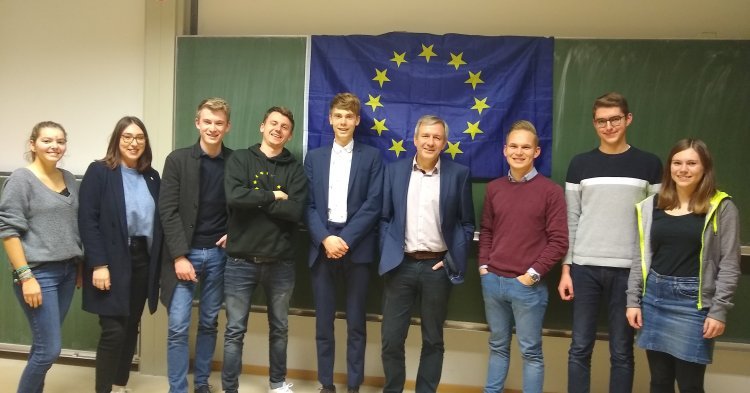In your presentation, you described the European elections as “second-order elections”. Does that mean that the European elections are still not real “European” elections for you?
Exactly. It is about national topics, national parties, national governments. It is not about conflicts over European topics. It is also not about electing European politicians. The voters, as well as the parties, view these elections as “intermediate elections” – basically a way to influence their own national parliaments.
You talked a little about the history of the European Parliament, especially the extension of its competences. Will this trend continue?
The European Parliament has achieved a lot. As an institution, it is certainly one of the biggest winners with regards to European integration. But I think that the Parliament has achieved the maximum that it can achieve. What is still missing is the right of initiative for European laws – that is an anomaly. Parliament has, of course, tried to gain even greater influence over the appointment of the EU Commission through the Spitzenkandidaten process, which ultimately failed. The most important things are becoming a co-legislator, having to approve the budget, and being able to say yes or no to the appointment of the Commission – these are already great successes. I cannot imagine that it will go much further.
For you, the main headline of the election results was the “fragmentation” of the Parliament. Six months on, is this still your opinion? And can we already see the consequences of this fragmentation?
It is important to note that, although the Eurosceptic parties have gained, the very European-friendly parties – Greens and Liberals – have also gained, so the overall balance of power between Europe-friendly and anti-EU forces has not changed significantly. It is the party landscape that has become more open and fragmented. I think it’s good for Parliament that this long-lasting coalition between the Social Democrats and the Christian Democrats has been dissolved. What we do not yet know exactly is what the impact will be. It will certainly become more colourful and unpredictable, and whether, in the end, Parliament will benefit – because it will become a more diverse forum for discussion – or be harmed – because it is no longer in a position to pursue politics so effectively – we must wait and see.
What consequences does the election result have for our traditional idea of the left-right dimension? Is it still valid, given the rising importance of other issues?
Valid, yes – but no longer dominant. The parties that are located mainly on this left-right axis have lost. Those which are located on the ‘new’ axis – of open versus closed, nationalism versus transnationalism, progressive cultural values versus traditional cultural values – these parties have become stronger. We will see more and more conflicts on this level in the future. So far, it has always been the case that left and right parties have been agree on the importance of European integration. The conflicts that have occurred in the European Parliament have not surfaced in debates as often or thoroughly as they should have done in order to make Parliament truly representative. In the future, I expect to see a clear improvement in this.
You concluded that the European elections contributed to a “normalisation” of the European Parliament. Why?
One important observation is the increased turnout, bringing the parliament slightly closer to the turnout we would expect in national parliamentary elections. Secondly, the Parliament has become more representative, precisely along these new, more cultural lines of conflict, with this grand coalition no longer having a majority. In my view, party politics will play a greater role in the future in this institution. So far, party political interests have not been as important as the Parliament’s fight against other institutions. That is now set to change.


Follow the comments: |
|
